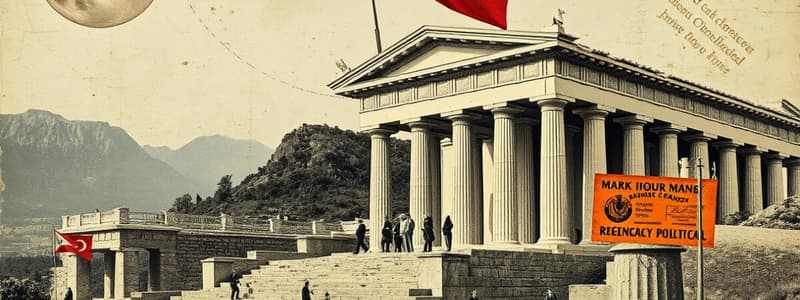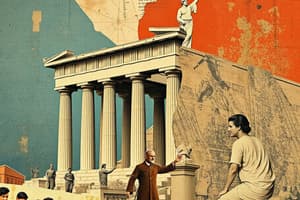Podcast
Questions and Answers
What does Plato believe needs to happen to bring peace and harmony to cities and to the human race?
What does Plato believe needs to happen to bring peace and harmony to cities and to the human race?
Philosophers must become kings or rulers must have the spirit and power of philosophy.
Aristotle believed that man is by nature a political animal.
Aristotle believed that man is by nature a political animal.
True (A)
Which form of government did ancient Greeks develop to prevent authoritarian rule?
Which form of government did ancient Greeks develop to prevent authoritarian rule?
- Direct Democracy (correct)
- Republic
- Monarchy
- Oligarchy
What type of democracy allows citizens to elect representatives to propose and vote on laws?
What type of democracy allows citizens to elect representatives to propose and vote on laws?
What was the significance of the Twelve Tables in Rome?
What was the significance of the Twelve Tables in Rome?
Who were the patricians in the early Roman Republic?
Who were the patricians in the early Roman Republic?
Women were allowed to serve as jurors in Athenian democracy.
Women were allowed to serve as jurors in Athenian democracy.
A leader with absolute power to make laws and command the army in the Roman Republic is known as a __________.
A leader with absolute power to make laws and command the army in the Roman Republic is known as a __________.
How did Rome influence the development of democracy in the Western world?
How did Rome influence the development of democracy in the Western world?
Which of these forms of government is based on citizenship?
Which of these forms of government is based on citizenship?
What is the primary distinction of ancient Greek civilization?
What is the primary distinction of ancient Greek civilization?
Who is generally regarded as the founder of democracy in Athens?
Who is generally regarded as the founder of democracy in Athens?
What was Solon's contribution to Athenian democracy?
What was Solon's contribution to Athenian democracy?
All Athenian residents were citizens in ancient Athens.
All Athenian residents were citizens in ancient Athens.
What did Pericles do to strengthen Athenian democracy?
What did Pericles do to strengthen Athenian democracy?
The term democracy comes from the Greek words 'demos' meaning ______ and 'kratos' meaning ______.
The term democracy comes from the Greek words 'demos' meaning ______ and 'kratos' meaning ______.
What was the council of elders in Igbo village government?
What was the council of elders in Igbo village government?
What is an oligarchy?
What is an oligarchy?
In Athenian democracy, all citizens had equal rights and opportunities.
In Athenian democracy, all citizens had equal rights and opportunities.
Flashcards are hidden until you start studying
Study Notes
Power and Authority
- Ancient Greece developed democracy; Rome introduced representative government.
- Modern democratic governments value citizen participation for authority.
Early Governance
- Early societies had informal leadership; larger groups required formal governance.
- Rulers such as kings or chieftains often wielded absolute power until self-governance ideals emerged.
City-States in Greece
- Greeks established city-states around 2000 B.C. in fertile valleys.
- Varied governments emerged:
- Monarchy—ruled by a king
- Aristocracy—ruled by noble families
- Oligarchy—ruled by a small, powerful elite.
Democracy Origin
- The term "democracy" derives from Greek: 'demos' (people) and 'kratos' (power).
- Athens became the largest and most influential city-state promoting democratic governance.
Athenian Democracy
- Only adult male residents were considered citizens with rights and responsibilities.
- Annual elections of nobles led to council advisory roles after one year of service.
Economic Issues in Athens
- Around 600 B.C., economic hardship led poor farmers to pledge crops and land to wealthy landowners, risking slavery.
- Reforms were necessary to address the political and economic crises.
Contribution of Solon
- Solon, a significant statesman, abolished debt slavery and canceled farmers' debts in 594 B.C.
- Introduced classes of citizenship based on wealth, allowing voting for lower classes but limiting office holding.
- Established the Council of Four Hundred to enhance governmental participation.
Cleisthenes' Reforms
- Cleisthenes (508 B.C.) restructured the assembly and is regarded as the founder of democracy in Athens.
- Increased citizen participation by allowing law proposals and creating the Council of Five Hundred, chosen randomly.
Persian Wars and Democratic Strengthening
- Greek city-states united against Persian invaders (490-479 B.C.) and maintained democratic practices during the conflict.
- Pericles (461-429 B.C.) advanced democracy by increasing paid public roles, enabling poorer citizens to engage in governance.
Philosophy and Democracy
- Greek philosophers like Socrates, Plato, and Aristotle emphasized reason in understanding governance and human nature.
- Socrates' method encouraged critical examination of beliefs; Plato envisioned society led by philosopher-kings, believing in political wisdom.
Legacy of Ancient Greece
- Greece laid foundational principles for democracy, emphasizing citizens' roles in governance.
- They pioneered the concept of separation of powers with branches of government to ensure checks and balances.### Athenian Democracy
- Citizenship in Athens was restricted to male individuals who were at least 18 years old and had citizen parents.
- Political power was exercised directly by citizens through participatory assemblies.
- Athenian laws were proposed and voted on directly by citizens assembling together.
- Leadership positions were randomly assigned via lottery, ensuring no single candidate could dominate.
- The executive branch consisted of a council of 500 men responsible for implementing laws.
- Jury sizes varied between 201 and 2,500 members, with no attorneys allowed and trials lasting only one day.
Jury Duty in Ancient Athens
- Jury duty was a significant civic responsibility for Athenian males; women were excluded from serving.
- Juries rendered verdicts by casting bronze ballots, with hollow ballots indicating guilty votes and solid ones for acquittals.
- Citizens could vote to ostracize individuals, banishing them for ten years using an inscribed piece of pottery called an ostrakon.
Roman Republic Formation
- The Roman Republic emerged around 509 B.C. after aristocrats overthrew a tyrant king, moving from monarchy to a government where power rested with citizens.
- Republics differ from direct democracies as citizens elect representatives to make governmental decisions.
- Both patricians (aristocratic landowners) and plebeians (common citizens) existed in early Rome, with political power historically leaning towards patricians.
Twelve Tables of Rome
- The Twelve Tables were established in 451 B.C. as a written code of law, ensuring protections and fairness for all free citizens.
- This laid the foundation for legal accountability and transparency in governance.
Structure of the Roman Government
- Government was divided into branches: consuls (executive leaders), a senate (advisory role controlling foreign/financial policy), and assemblies representing various social classes.
- Consuls had a one-year term; emergency situations allowed for a dictator with six-month terms.
Roman Legal Principles
- Roman law asserted equal treatment for all citizens and presumed innocence until proven guilty.
- The burden of proof fell primarily on the accuser, allowing laws deemed unreasonable to be set aside.
- The written legal code represented a commitment to law guiding governance, encapsulating the principle of accountability.
Legacy of Roman Governance
- The Roman Republic introduced the concept of the republic and emphasized citizenship over subjects under a ruler.
- Rome's commitment to a uniform legal code influenced democratic principles across Western civilizations, promoting the idea of laws being applied fairly to all individuals.
Studying That Suits You
Use AI to generate personalized quizzes and flashcards to suit your learning preferences.




